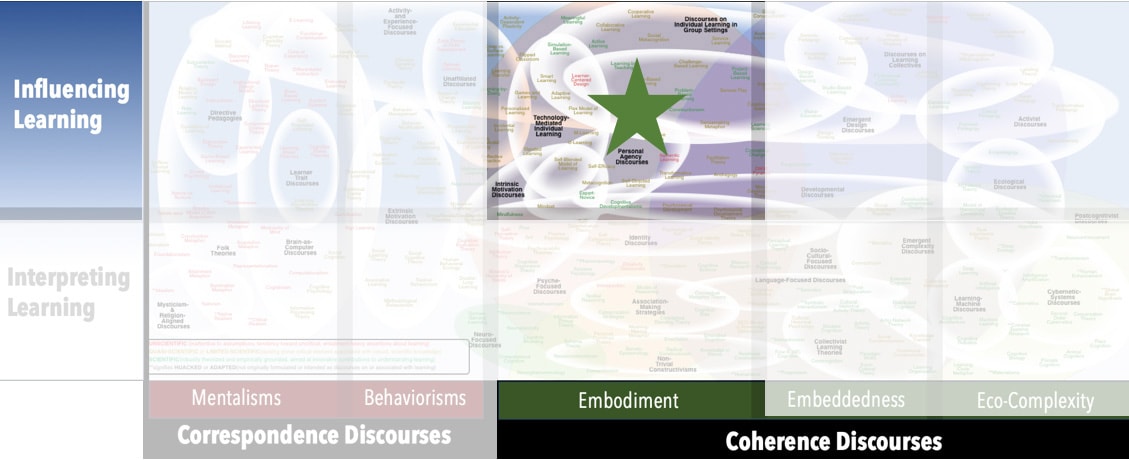AKA
Educational Neuroscience
Mind–Brain–Education
Neurodidactics
Neuropedagogy
There is a long history of interpreting learning in terms of the latest technologies. Examples include writing on a tablet, taking photographs and films, and making connections on a telephone switchboard. Brain-as-Computer Discourses represent an uncritical continuation of this trend, through which knowledge is reduced to information and learning is cast as inputting and manipulating that information.
Learn More...Non-Trivial Constructivisms encompass a range of learning theories that invoke a “learning as construing” – vs. a “learning as constructing” – metaphor. The construing–constructing distinction is critical, and it became an issue because the French verb construire can be translated as either “to construe” (i.e., to integrate elements to make sense of) or “to construct” (i.e., to build something).
Learn More...Within Developmental Discourses, learning is understood as a recursively elaborative process rather than a linear accumulative one. Most Developmental Discourses focus on how learners’ key habits of perception and interpretation change amid predictable sequences of biological, psychological, and emotional transformation.
Learn More...“Learning as acquisition” – the Acquisition Metaphor – is probably the most commonly invoked learning metaphor in English. It is evident in such phrases as “grasping the point,” “taking things in,” “getting it,” “picking things up,” “hard to swallow,” “remember this stuff,” and “cramming for the test.” It is not theoretically sophisticated, relying on the assumption that knowledge comprises externalized objects, and asserting that learning is a process of moving those objects from the outside to the inside.
Learn More...Proponents of Brain-Based Learning claim almost the same conceptual territory as Neuroeducation, with a somewhat more pragmatic emphasis. Brain-Based Learning aims to interrupt entrenched practices, conventions, and assumptions about the learning process by drawing scientific research into brain function and cognitive development, but its main focus in on school programs, lesson designs, and teaching methods.
Learn More...Behaviorisms reject the notion that knowledge is some sort of external, stable, and context-free form. Rejecting attempts to explain learning in terms of unobservable mental processes, Behaviorisms focus instead on observable and measurable phenomena – thus operationally defining learning in terms of changes in behavior that are attributable to environmental factors.
Learn More...Neuroscience is a multidisciplinary branch of biology that focuses on the structure, functions, and development of the nervous system. With a scope that spans the thousands of distinguishable substructures between the molecular to the cognitive, Neuroscience combines domains as varied as molecular biology, physiology, and psychology (among many others) while it has given rise to many other disciplines.
Learn More...Mentalisms reach across any theory that (1) assumes a separation of mental from physical (inner from outer, subjective from objective, etc.) and (2) casts learning in terms of mental images, models, encodings, or other inner representations of the existing world. Some sort of barrier – typically the body, or fallible senses, or faulty subjective interpretations – is seen to prevent direct, first-hand knowledge of reality.
Learn More...Focus
Bridging the fields of Neuroscience and education
Principal Metaphors
- Knowledge is … scope of possible actions and interpretations
- Knowing is … higher-order functions, located mainly in the brain
- Learner is … a cognizing system
- Learning is … systemic changes, located mainly in the brain
- Teaching is … triggering learning
Originated
1990s
Synopsis
Neuroeducation weaves among Neuroscience, psychology, educational technology, and other relevant disciplines in studies of the interactions of biological processes and educational efforts. Its broad aim is to generate a research base that will inform and orient teaching in a comprehensive and coherent way (in contrast to piecemeal offerings of Brain-Based Learning and other popular, quasi-scientific offerings). To date, however, contributions have been modest and narrowly focused – for example, with neural mechanisms associated with reading, numeration, and attention, along with associated learning difficulties/disabilities.
Commentary
Critiques of Neuroeducation are many and varied. A common concern revolves around the conceptual gulf between Neuroscience’s focus on the brain and its medical model of cognition and education’s need to distribute its attentions across psychological, epistemological, social, cultural, and ecological obligations. Echoing a problem encountered by Behaviorisms nearly a century ago, teaching methods based on Neuroscience require artificial and controlled settings that are utterly unlike typical classrooms. Further, in our review of the Neuroeducation literature, we were surprised at the unsophisticated vocabulary around learning (typically invoking the Acquisition Metaphor and/or the “inputting information” metaphor of Brain-as-Computer Discourses) and teaching (most commonly interpreted in terms of affecting behaviors). This lack of sophistication may help to explain why so many of Neuroeducation’s claimed contributions are little more than validations of certain Developmental Discourses and Non-Trivial Constructivisms. That said, Neuroeducation has helped to undermine persistent neuromyths (e.g., left/right brain; inborn intelligences) and to provide more precise diagnoses and nuanced recommendations for specific educational needs.
Authors and/or Prominent Influences
Diffuse
Status as a Theory of Learning
Neuroeducation is not a theory of learning. Indeed, if and when descriptive references are made to learning, they tend to invoke vocabularies and metaphors associated with Mentalisms.
Status as a Theory of Teaching
Neuroeducation is perhaps best classified as a theory of teaching, as an explicit aim is to frame insights from Neuroscience in manners that are useful to and usable by teachers.
Status as a Scientific Theory
Neuroeducation meets the criteria of a scientific theory, although it could be faulted for its unsophisticated characterizations of learning, teaching, and schooling.
Map Location

Please cite this article as:
Davis, B., & Francis, K. (2021). “Neuroeducation” in Discourses on Learning in Education. https://learningdiscourses.com.
⇦ Back to Map
⇦ Back to List

